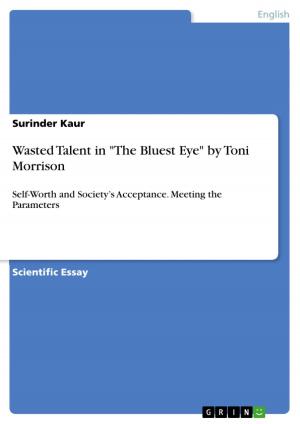With reference to relevant psychological theory and research critically discuss the factors which make social judgement of ourselves and others difficult
Nonfiction, Health & Well Being, Psychology, Social Psychology| Author: | Rogan McCartan | ISBN: | 9783656162056 |
| Publisher: | GRIN Verlag | Publication: | March 29, 2012 |
| Imprint: | GRIN Verlag | Language: | English |
| Author: | Rogan McCartan |
| ISBN: | 9783656162056 |
| Publisher: | GRIN Verlag |
| Publication: | March 29, 2012 |
| Imprint: | GRIN Verlag |
| Language: | English |
Seminar paper from the year 2011 in the subject Psychology - Social Psychology, grade: 15.00/15.00, Staffordshire University, course: Psychology and Counselling, language: English, abstract: The human mind possess an incessant urge to seek explanations for the behaviour of others and of ourselves in order to render the world, other people, and our future, predictable, safe and fundamentally under our control (McArthur, 1972). One means of explaining the behaviour of others was asserted by Jones and Davis (1965) in their correspondent inference theory. This theory posits that we believe the behaviour of others corresponds to an underlying disposition that they possess, and that several factors influence the likelihood of this. Freely chosen behaviour, socially undesirable behaviour (because it is counter normative) (Jones, Davis & Gergen, 1961) and behaviour that has hedonic relevance (important consequences for the self) are more likely to be attributed to a disposition. Furthermore, behaviour that appears to be directly intended to harm/benefit us leads to a correspondent inference (personalism), as does behaviour with effects exclusive specifically to that behaviour (Non-common effects), as we tend to assume that the behaviour in question was produced specifically for that effect (outcome bias) (Allison, Mackie & Messick, 1996).
Seminar paper from the year 2011 in the subject Psychology - Social Psychology, grade: 15.00/15.00, Staffordshire University, course: Psychology and Counselling, language: English, abstract: The human mind possess an incessant urge to seek explanations for the behaviour of others and of ourselves in order to render the world, other people, and our future, predictable, safe and fundamentally under our control (McArthur, 1972). One means of explaining the behaviour of others was asserted by Jones and Davis (1965) in their correspondent inference theory. This theory posits that we believe the behaviour of others corresponds to an underlying disposition that they possess, and that several factors influence the likelihood of this. Freely chosen behaviour, socially undesirable behaviour (because it is counter normative) (Jones, Davis & Gergen, 1961) and behaviour that has hedonic relevance (important consequences for the self) are more likely to be attributed to a disposition. Furthermore, behaviour that appears to be directly intended to harm/benefit us leads to a correspondent inference (personalism), as does behaviour with effects exclusive specifically to that behaviour (Non-common effects), as we tend to assume that the behaviour in question was produced specifically for that effect (outcome bias) (Allison, Mackie & Messick, 1996).















